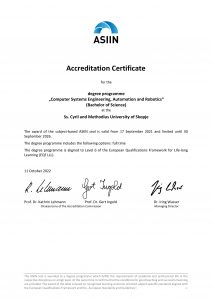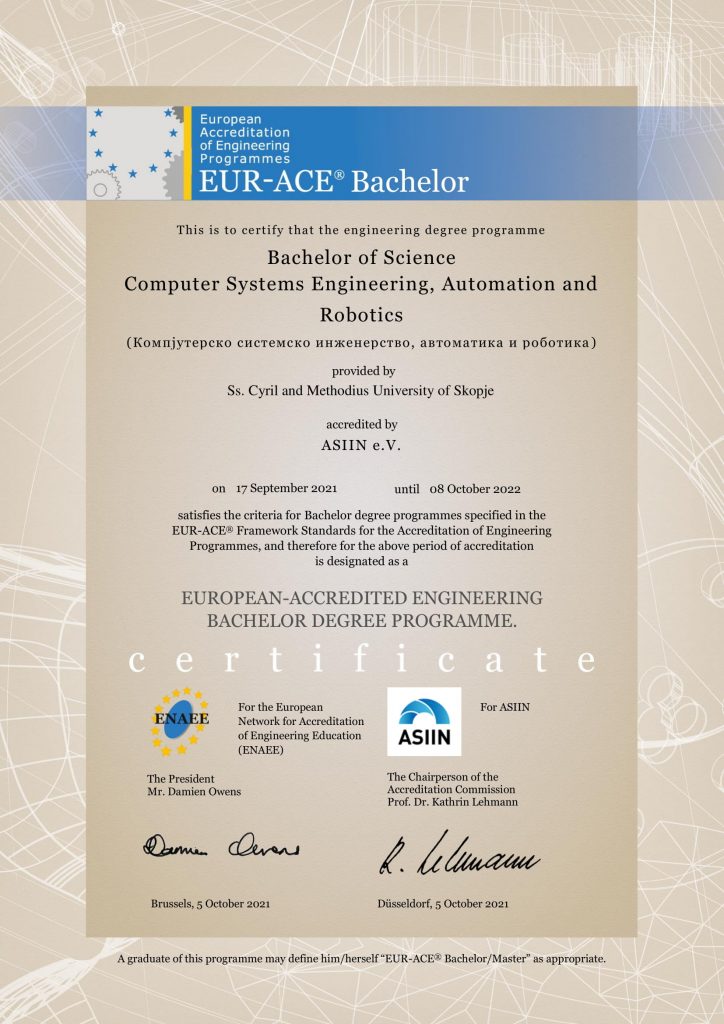ObjectivesLearning outcomesIIIIIIIVVVIVIIVIIIElective Courses
Study Programme
Computer System Engineering, Automation and Robotics
Degree Programme
First cycle degree programme
Level of qualification
Bachelor of Science in Electrical Engineering and Information Technologies, in Computer System Engineering, Automation and Robotics
Occupational Profiles of Graduates
The ever present increase in production efficiency, quality and optimization, demands a constant exploitation of integrated and advanced automation concepts in both technical and non-technical systems (eco-systems, economic systems, medical systems, etc.). Therefore, the programme strives to insure that engineers graduated through it find a wide variety of employment and advancement opportunities: they will be able to identify, analyze, understand and solve problems in different environments, from industrial plants to non-technical settings. They will be competent to work with modern industrial automation, with supervision, remote control and data acquisition systems, as programmers and hardware or software engineers, in academic institutions and/or research centers, etc.
The Programme Learning Outcomes
Students gain extensive fundamental and practical knowledge from all disciplines in system engineering, control theory, automation and robotics. The acquired knowledge and skills are based on modern scientific knowledge in the fields of automation and robotics, computer information technologies, process control, management, bioengineering, cybernetics in medicine, measurement-process technology, industrial internet of things, etc. Students will gain knowledge of: presenting, modeling and analyzing the behavior of systems of different natures (not only technical ones), application of methods, techniques and tools for mathematical systems analysis and problem solving using a systemic approach, comprehension of methods for information processing and data acquisition in the control and automation systems, analysis and synthesis of automatic control systems, robotic systems, artificial intelligence and machine learning systems, intelligent control systems and more, application of control systems elements (hardware and software modules) for process automation, automation of manufacturing plants, computer-controlled systems, electromechanical systems, and process measurements and actuators, analysis and design of SCADA systems for various industrial processes, computer process control and remote control, work with highly automated robotic systems etc. Using the acquired knowledge, the engineer of this study program will be trained for creative thinking and problem solving, individual and team work, effective communication, decision making and lifelong learning. This is all expected to make them well suited for and competitive in the domestic and the European labor market.
International Accreditation
The first cycle study programs at FEEIT are accredited by the German Accreditation Agency for Study Programmes in Engineering, Informatics, Natural Sciences and Mathematics (ASIIN), which is a world leader in quality assurance in higher education. This accreditation confirms that the study programs satisfies the criteria for Bachelor degree programs specified in EUR-ACE Framework standards for the accreditation of engineering programs and the content studied are relevant to areas covered in study programs.


General Learning Outcomes
| Knowledge and understanding |
- Demonstrate knowledge and understanding in the scientific field of electrical engineering, based on education and training, including knowledge of theoretical, practical, conceptual, comparative, and critical perspectives in the scientific field according to the appropriate methodology.
|
| Application of knowledge and understanding |
- Demonstrate the ability to apply acquired knowledge and understanding in a professional manner.
- An ability to identify, analyze and solve complex engineering problems by selecting an appropriate method.
|
| Ability to assess |
- An ability to collect, analyze, evaluate and present information, ideas, and concepts based on relevant data.
- Making an appropriate assessment taking into account personal, social, scientific and ethical aspects.
|
| Communication skills |
- An ability to communicate effectively in both verbal and written forms with professional and non-professional audiences.
- An ability to work effectively as an individual or as a member of a team taking shared responsibility for collective results.
- Ability to participate independently, in a professional manner, in regards to scientific and interdisciplinary discussions.
|
| Learning skills |
- Commitment to the professional development and lifelong learning achieved through higher education, technical training, membership in professional societies, and other activities in order to update already acquired knowledge in the relevant field to achieve continuous professional growth.
- An ability to acquire and apply new knowledge as needed using appropriate learning strategies.
|
Specific Learning Outcomes
| Knowledge and understanding |
- Demonstrate knowledge and understanding in the scientific field of electrical engineering, based on education and training, including knowledge of theoretical, practical, conceptual, comparative, and critical perspectives in the scientific field according to the appropriate methodology.
- Demonstrates knowledge and understanding of research, development, and application of knowledge in computer system engineering, automation and robotics, as well as engineering design in industrial processes.
- Understanding and knowledge of current issues related to scientific research and new sources of knowledge.
|
| Application of knowledge and understanding |
- An ability to identify, analyze and solve complex engineering problems.
- An ability to apply knowledge and understanding in a way that demonstrates professionalism to the relevant field or profession.
- An ability to identify, analyze and solve problems related to computer system engineering, automation and robotics.
|
| Ability to assess |
- An ability to collect, analyze, evaluate and present information, ideas and concepts from relevant data.
- Making an appropriate assessment taking into account personal, social, scientific and ethical aspects.
- An ability to provide answers to both theoretical and practical issues, in order to give explanations and choose the appropriate solution.
- An ability to collect, analyze, evaluate and present information, ideas and concepts from relevant data in the field of computer system engineering, automation and robotics.
|
| Communication skills |
- An ability to communicate effectively in both verbal and written forms with professional and non-professional audiences.
- An ability to work effectively as an individual or as a member of a team taking shared responsibility for collective results.
- An ability to participate independently and professionally in specific, scientific and interdisciplinary discussions.
|
| Learning skills |
- Commitment to professional development and lifelong learning through higher education, technical training, membership in professional societies, and other activities in order to update already acquired knowledge in the field and to achieve continuous professional growth.
- An ability to acquire and apply new knowledge as needed, using appropriate learning strategies.
- Demonstrate a high degree of independence initiative for learning and professional development.
- Understanding the need for learning and ability for continuous professional development, through the use of professional and scientific literature, professional training, continuing formal education, membership in professional organizations, etc.
- Awareness of new technologies and the ability to evaluate and use modern software development tools.
- An ability to use information technologies for distance and e-learning.
- Skills for cooperative, competitive and individual learning.
- Applying active teaching and learning techniques.
|
| During studying, the student may choose up to 4 courses from the faculty list of electives |
| During studying, the student may choose up to 4 courses from the faculty list of electives |
| During studying, the student may choose up to 4 courses from the faculty list of electives |
| During studying, the student may choose up to 4 courses from the faculty list of electives |
| During studying, the student may choose up to 4 courses from the faculty list of electives |
| During studying, the student may choose up to 4 courses from the faculty list of electives |





